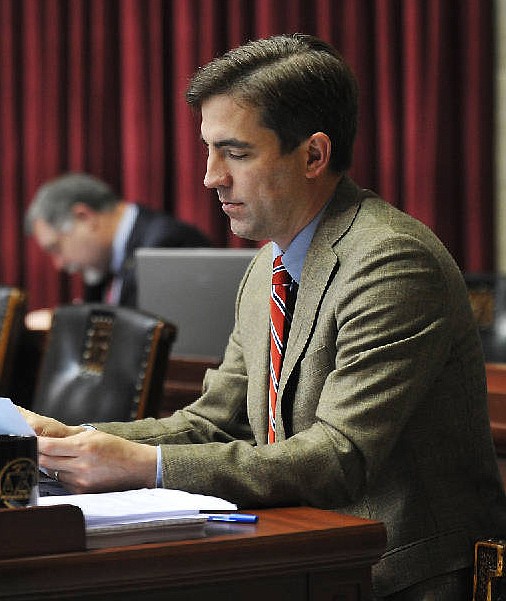State Rep. Jay Barnes said the 2017 legislative session - which ended last Friday - was successful.
In an hour-long, wide-ranging visit with members of the Cole County Republican Club, Barnes talked about some of the bills he worked on as well as state Auditor Nicole Galloway's report this week that lawmakers may have authorized more fees last year than is allowed by the state's Hancock Amendment.
"I had a little bill that allows dentists to practice in emergency rooms in certain situations," he said, "which you would never think was illegal.
"The weekend after it got (approved), there was somebody at a kids' soccer game talking about how their sister's son got a tooth knocked out, and there was no dentist available. And they couldn't get a dentist to the hospital to help them."
That will change Aug. 28, if Gov. Eric Greitens signs the bill, Barnes said.
The Jefferson City Republican praised lawmakers' passing the retirement change restoring a five-year vesting period for state employees - after it had been 10 years since Jan. 1, 2011.
"I think the change in the pension system is better than a pay raise for a single year," he said - although he's disappointed the Legislature didn't pass a pay raise for state employees.
"We have a difficult time making the case to legislators from outside (Mid-Missouri) every single year that it's necessary," he explained.
Barnes disputed Galloway's assertion this week that the Legislature violated the state's tax-and-fees limit in a bill passed last year.
"She got that from a fiscal note on a bill of which I was the (House) sponsor," Barnes explained. "That fiscal note for that bill estimated that there would be 600,000 filings for expungement in the state in the first year of the law's existence."
Barnes said he reviewed records for all criminal cases filed in Missouri last year, and in non-traffic cases, prosecutors filed only 140,000 criminal cases across the state.
"So, this fiscal note suggests that there are going to be four times as many expungement filings as there were actual criminal cases filed?" he said. "That is not going to happen."
The fiscal note also predicted about 5 percent of the people would file requests to expunge speeding tickets.
However, Barnes - who is an attorney - noted: "After three years, you don't have any points from that speeding ticket on your license.
"If somebody called me and asked me to represent them, to expunge a speeding ticket three years after the fact, I would tell them, 'Don't waste your money.'"
The auditor's report said the Hancock Amendment - approved by voters in 1980 and modified in 1996 - allows lawmakers to raise taxes and fees to a certain limit without requiring a statewide vote.
The limit last year was $94.3 million, Galloway said, but several bills passed last year, including the expungement law, could bring in $127.7 million, which would trigger statewide refunds.
Barnes said there wasn't time for lawmakers to challenge the original fiscal note.
"It was obviously so far off that it was ignored (by lawmakers)," he said. "Sometimes departments write fiscal notes in ways to justify new full-time employees.
"This fiscal note would have justified the hiring of 225 new employees."
Barnes said the expungement bill "allows for persons who have been convicted of non-violent, non-DWI, non-sex offenses to get the records of their conviction expunged - if they've completed their complete term and gone additional years (and) prove that they are an upstanding members of society."
Erasing their criminal records helps those people find jobs and get some rights restored, including being able to get and use hunting and fishing licenses, he said.
"Dozens of other states do this," he said. "They don't have 600,000 expungement filings in a single year."
He said the auditor's office told him state law required them to use the fiscal note that accompanied the bill, even though he disputes the fiscal note.
Barnes was asked, but didn't say, what he might be doing after term limits force him out of the Legislature at the end of next year.

